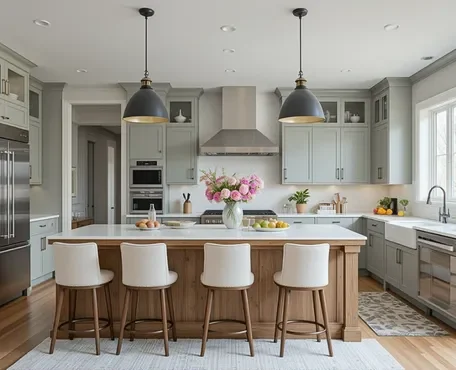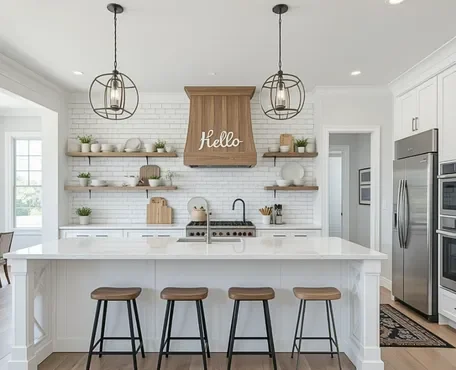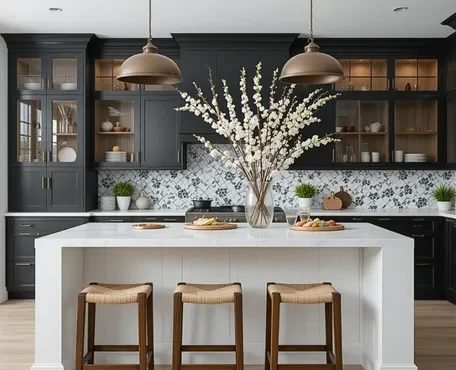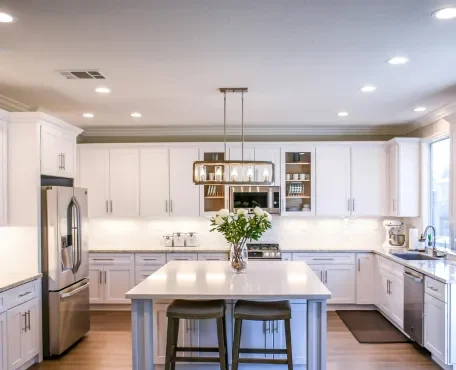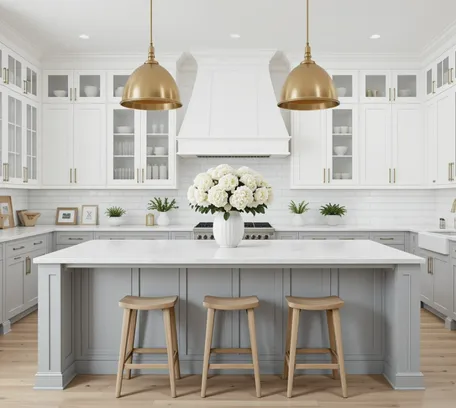

The best kitchen counter between elegance & effectiveness
The kitchen is often considered the heart of the home. It’s not just a place for cooking, but also for gathering, socializing, and creating memories. As such, the design and functionality of the kitchen play a crucial role in making it a welcoming and efficient space. Among the many elements that make up a kitchen, the kitchen counter is one of the most critical components. It serves as a workspace, a dining area, and a design focal point. When it comes to choosing the best kitchen counter, homeowners are often faced with a dilemma: striking a balance between elegance and effectiveness. This article covers key factors, materials, and pros and cons to help you choose kitchen counters that balance style and function.
We’ll explore kitchen countertops that combine style and practicality, highlighting their materials, pros, cons, and best uses.
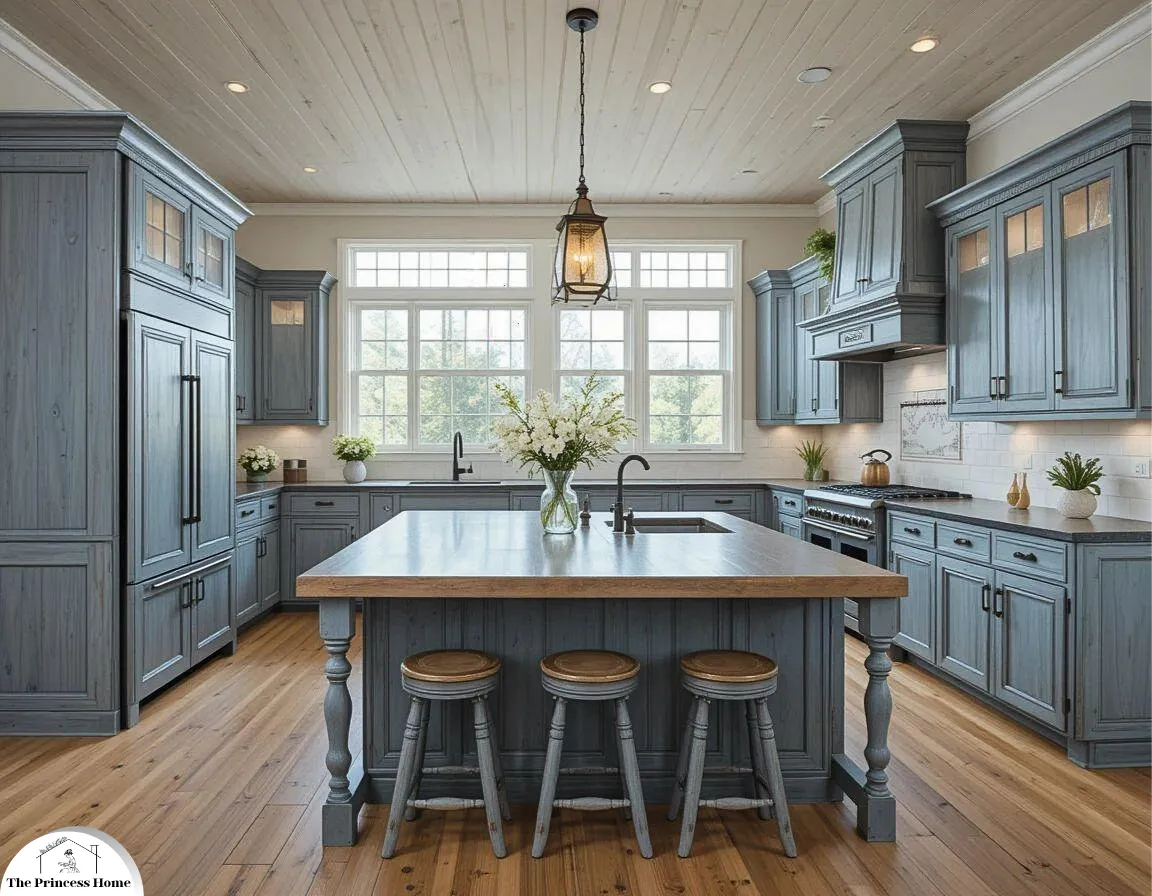
**Understanding the Role of Kitchen Counters**
Kitchen counters are multifunctional surfaces that are used for a wide range of activities. They are workspaces for preparing and cooking food, serving as a hub for culinary creativity. They also function as dining areas, where families and guests gather to share meals. Moreover, kitchen counters are integral to the overall design of the kitchen, contributing to its aesthetic appeal. Given these varied roles, it’s essential to choose a kitchen counter that can withstand the demands of daily life while enhancing the visual appeal of your kitchen.
The range of materials that can be used on island surfaces is amazingly diverse:
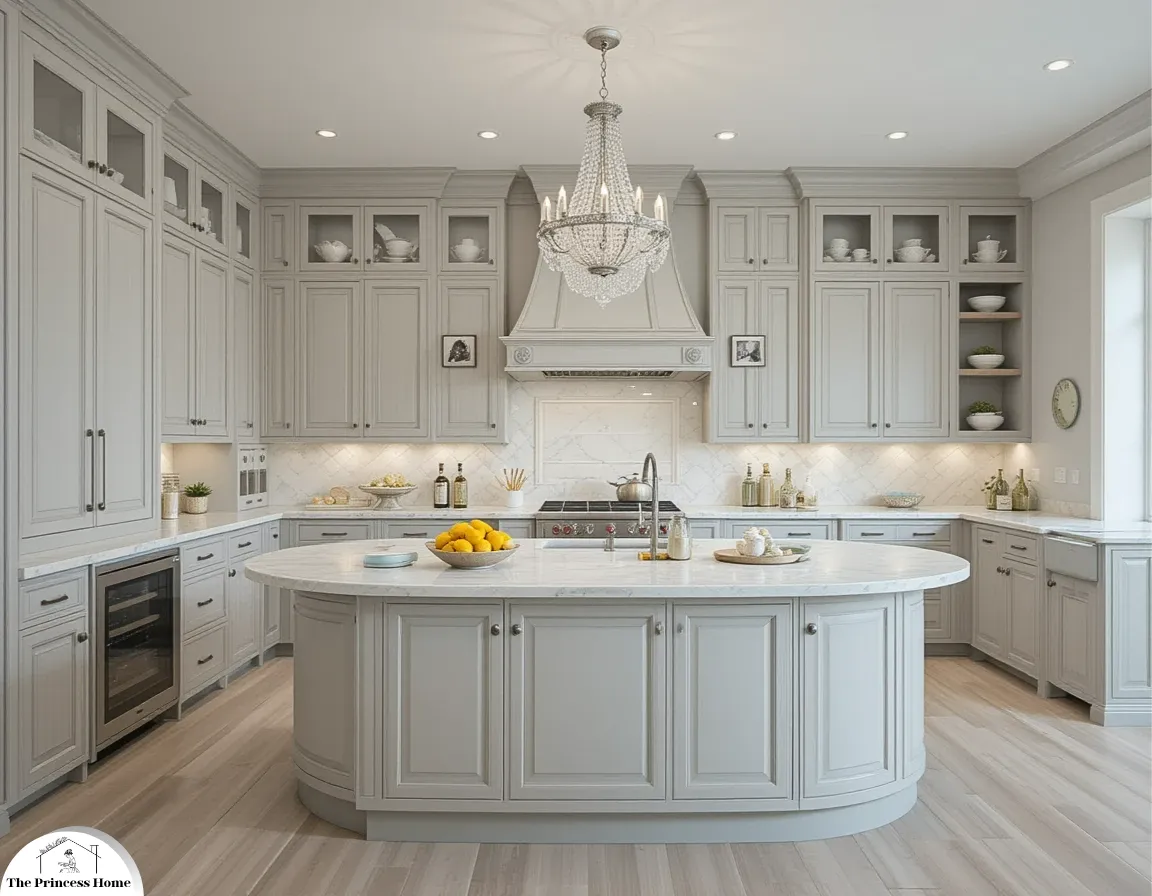
*Selecting the Right Material*
Kitchen counters are available in a wide array of materials, each with its own set of advantages and disadvantages. From durable quartz to elegant marble or eco-friendly bamboo, your choice can impact both function and style. Consider factors like maintenance, cost, and how the material complements your kitchen’s design. Let’s take a closer look at some of the most popular options:
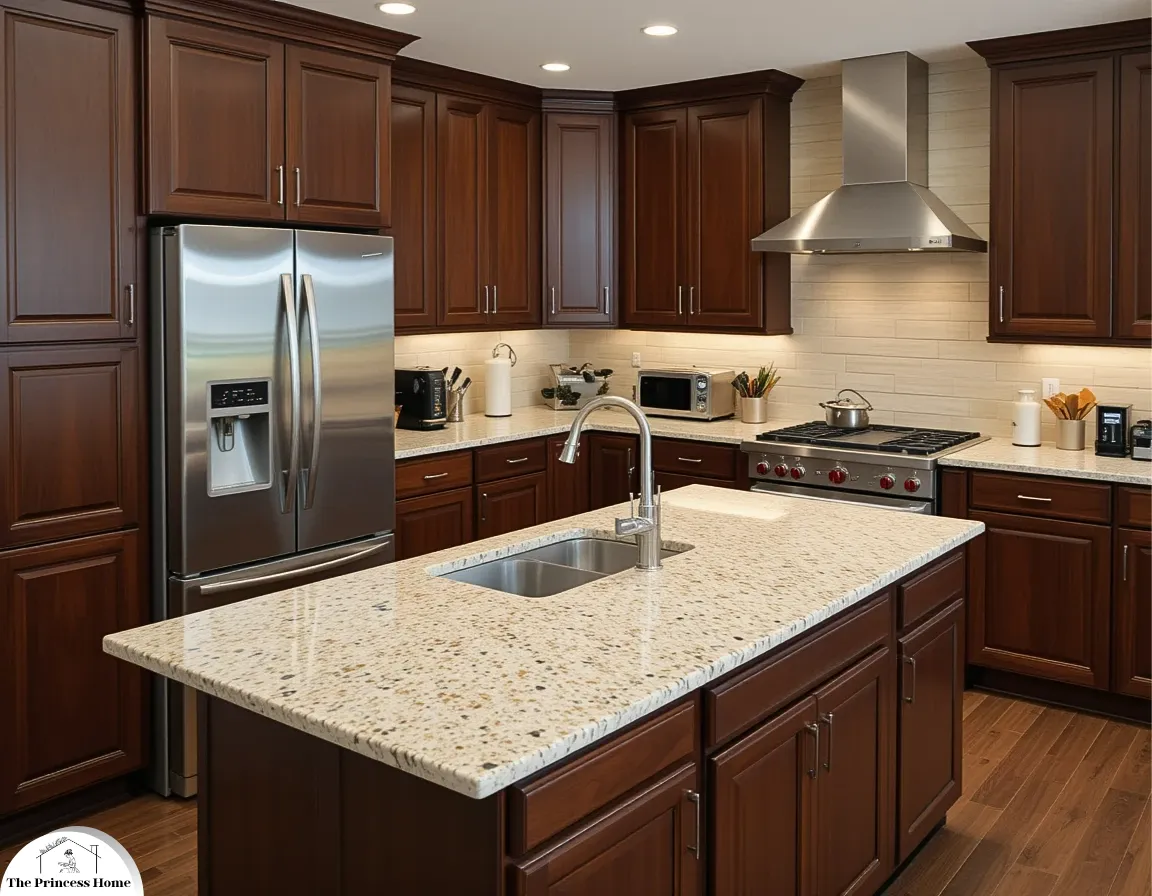
1. Granite
Granite countertops strike the perfect balance between elegance and functionality. Renowned for their durability and natural beauty, they are highly resistant to heat and scratches, making them an excellent choice for busy kitchens. Available in a wide range of colors and patterns, granite adds a touch of sophistication to any kitchen style. However, they do require regular sealing to preserve their appearance and longevity. Their timeless charm suits both classic and contemporary designs, and while the initial investment may be substantial, granite significantly enhances the overall value of your home.
Here’s a quick recap of granite countertops positives and negatives:
Positives:
- Durable and resistant to heat and scratches
- Elegant, natural beauty with a wide range of colors and patterns
- Versatile for both classic and contemporary kitchen styles
- Adds significant home value
Negatives:
- Requires regular sealing to maintain appearance and longevity
- Higher upfront cost compared to some materials
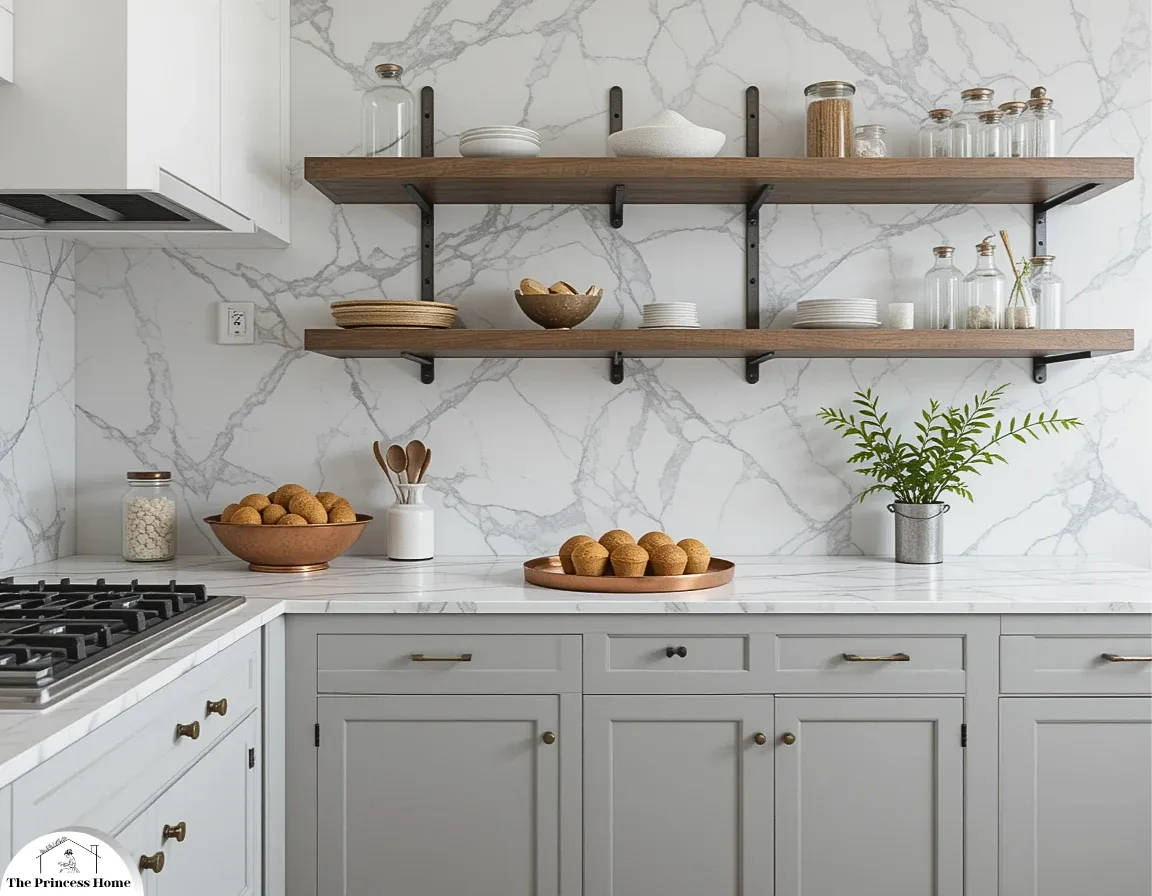
2. Quartz
Quartz countertops are engineered stone surfaces that combine the elegance of natural stone with the practicality of a non-porous, low-maintenance material. They are highly resistant to staining, chipping, and heat, making them ideal for everyday kitchen use. Quartz countertops come in a wide range of colors and patterns, allowing for extensive customization to suit any design aesthetic. Unlike natural stone, they do not require sealing, offering long-term convenience without compromising on style.
Here’s a summary of the positives and negatives of quartz countertops:
Positives:
- Low maintenance – non-porous and does not require sealing.
- Durable – resistant to staining, chipping, and heat.
- Stylish – offers a wide range of colors and patterns for customization.
- Consistent appearance – engineered for uniformity and design flexibility.
- Practical – ideal for everyday kitchen use.
Negatives:
- Less heat resistant than granite – can be damaged by very high heat.
- Not entirely natural – lacks the unique variation of natural stone.
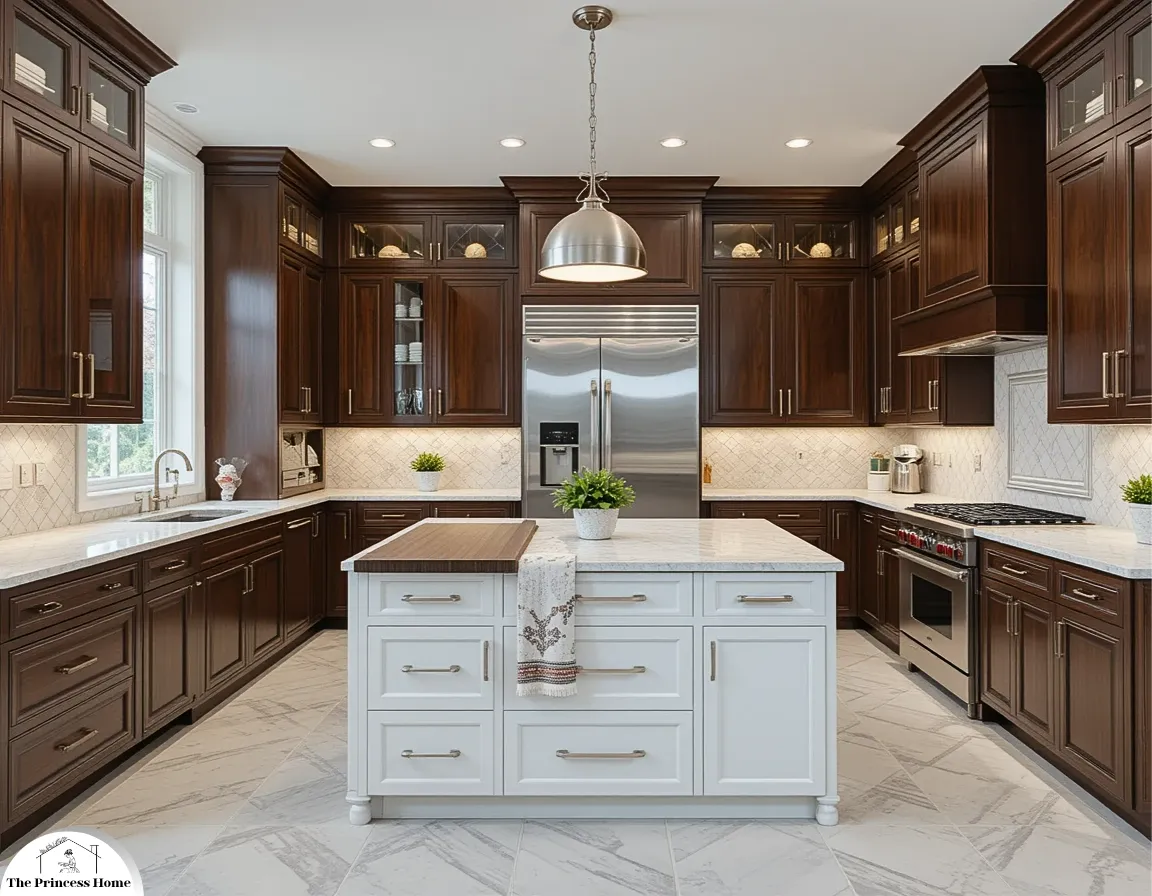
3. Marble
Marble countertops exude timeless elegance and luxury, often becoming the focal point of a sophisticated kitchen. While they are naturally heat-resistant, marble is a porous material, making it vulnerable to staining and etching from acidic substances. Proper sealing and regular maintenance are essential to preserve its pristine appearance. Despite requiring more care, marble’s unique veining and classic appeal make it a favorite for upscale, elegant kitchen designs.
Here’s a summary of the positives and negatives of marble countertops:
Positives:
- Elegant and luxurious – offers timeless beauty and classic appeal.
- Heat-resistant – naturally withstands high temperatures.
- Unique – distinctive veining makes each slab one of a kind.
- Aesthetic centerpiece – ideal for upscale, sophisticated kitchens.
Negatives:
- Porous – prone to staining and etching from acidic substances.
- High maintenance – requires regular sealing and careful upkeep.
- Less durable – softer than granite and quartz, making it more susceptible to scratches.
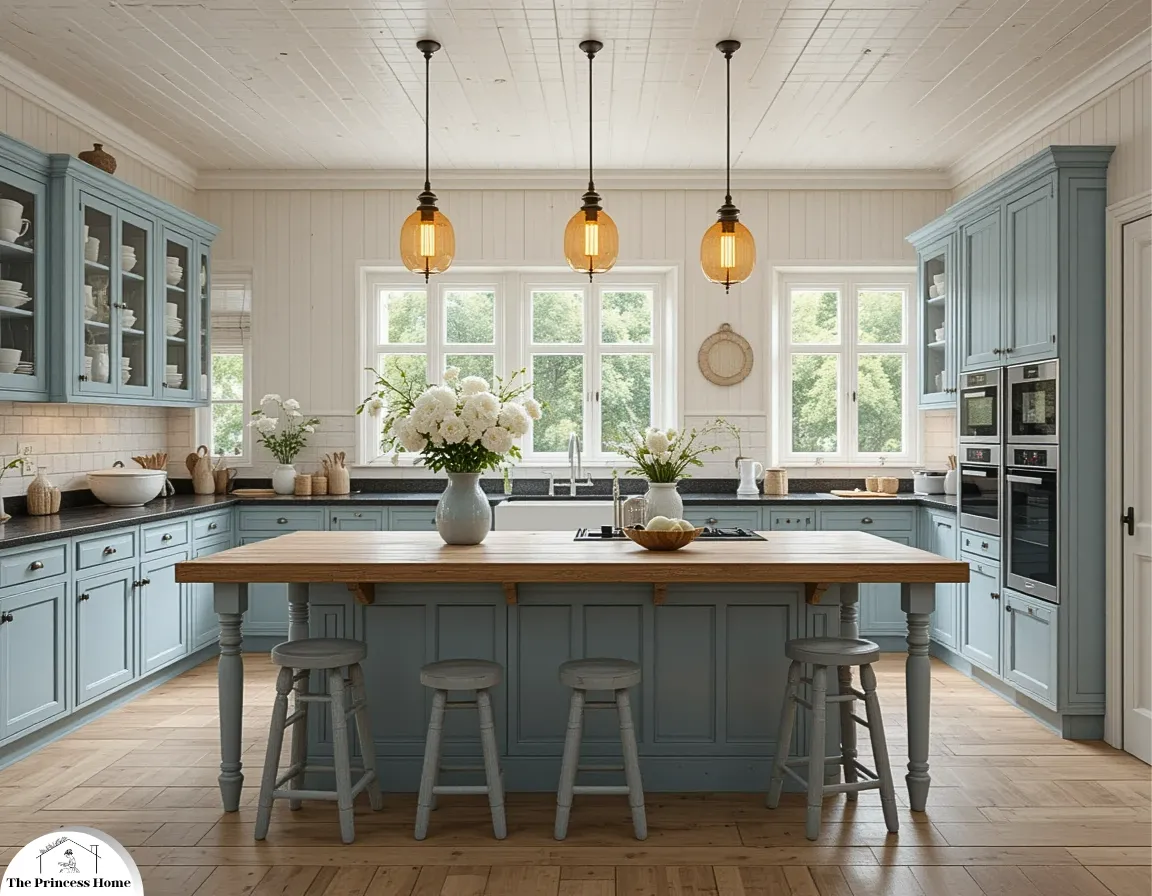
4. Wood butcher block
Wood countertops, typically crafted from durable hardwoods like maple, oak, or walnut, provide a warm and inviting aesthetic that adds natural charm to any kitchen. They are especially well-suited for rustic, farmhouse, or cottage-style interiors. However, wood is susceptible to scratches, dents, and moisture damage, requiring regular sealing and proper care. With consistent maintenance, wood countertops can age beautifully, developing a rich patina over time that enhances their character and appeal.
Here’s a summary of the positives and negatives of wood countertops:
Positives:
- Warm and inviting – adds natural charm and character.
- Aesthetic versatility – ideal for rustic, farmhouse, or cottage-style kitchens.
- Ages well – develops a rich patina over time with proper care.
- Repairable – scratches and dents can often be sanded out.
Negatives:
- High maintenance – requires regular sealing and upkeep.
- Vulnerable to damage – prone to scratches, dents, and moisture issues.
- Not heat-resistant – can scorch or burn if exposed to hot cookware.
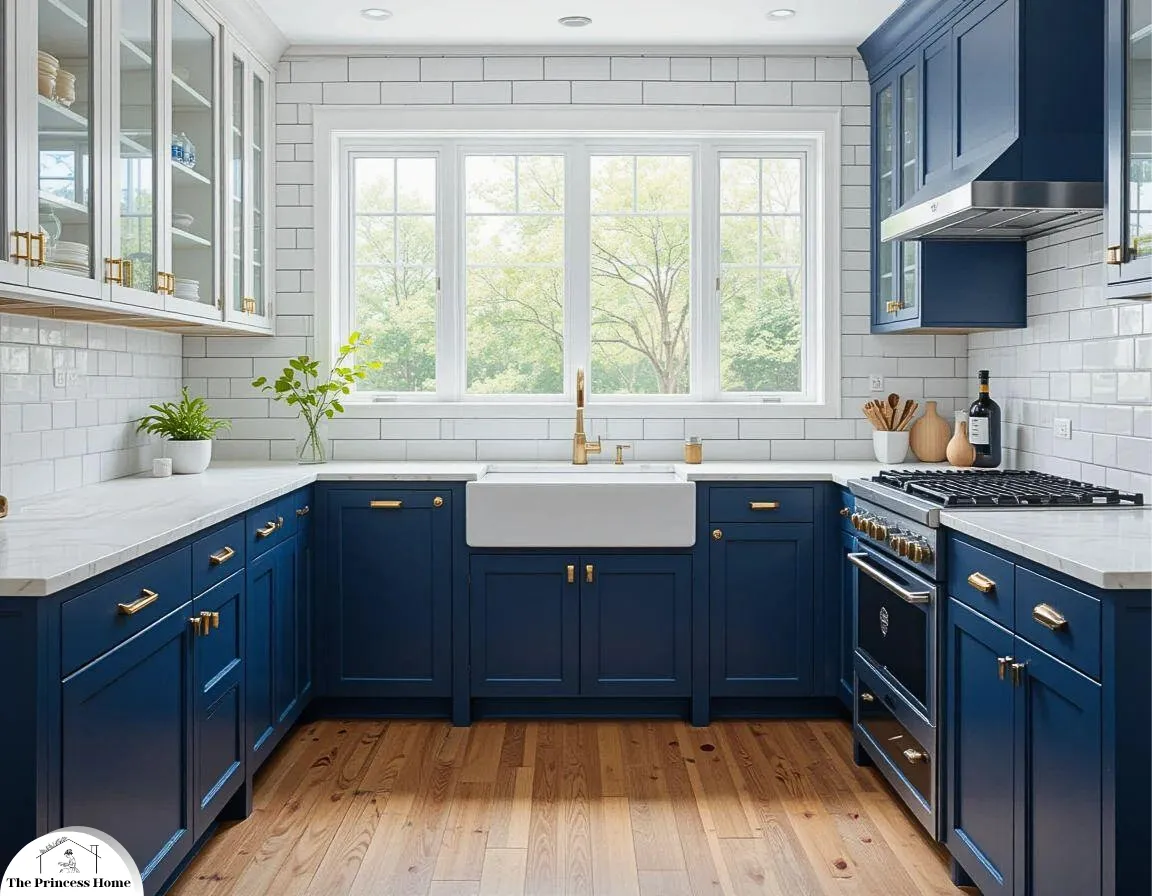
5. Laminate
Laminate countertops are a budget-friendly option that offers versatility in design, with a wide variety of colors, patterns, and finishes that can mimic more expensive materials. They are resistant to staining and easy to maintain, making them a practical choice for many households. However, laminate is susceptible to heat damage, scratches, and peeling over time, especially with heavy use. While not as durable or long-lasting as natural stone or solid wood, laminate remains a popular choice for affordable kitchen remodels.
Here’s a summary of the positives and negatives of laminate countertops:
Positives:
- Affordable – budget-friendly for cost-conscious remodels.
- Design versatility – available in many colors and patterns, including stone and wood lookalikes.
- Low maintenance – easy to clean and stain-resistant.
- Lightweight – easier to install than heavier materials.
Negatives:
- Not heat-resistant – can be damaged by hot pans or appliances.
- Less durable – prone to scratches, dents, and peeling with heavy use.
- Shorter lifespan – doesn’t last as long as natural stone or solid surfaces.
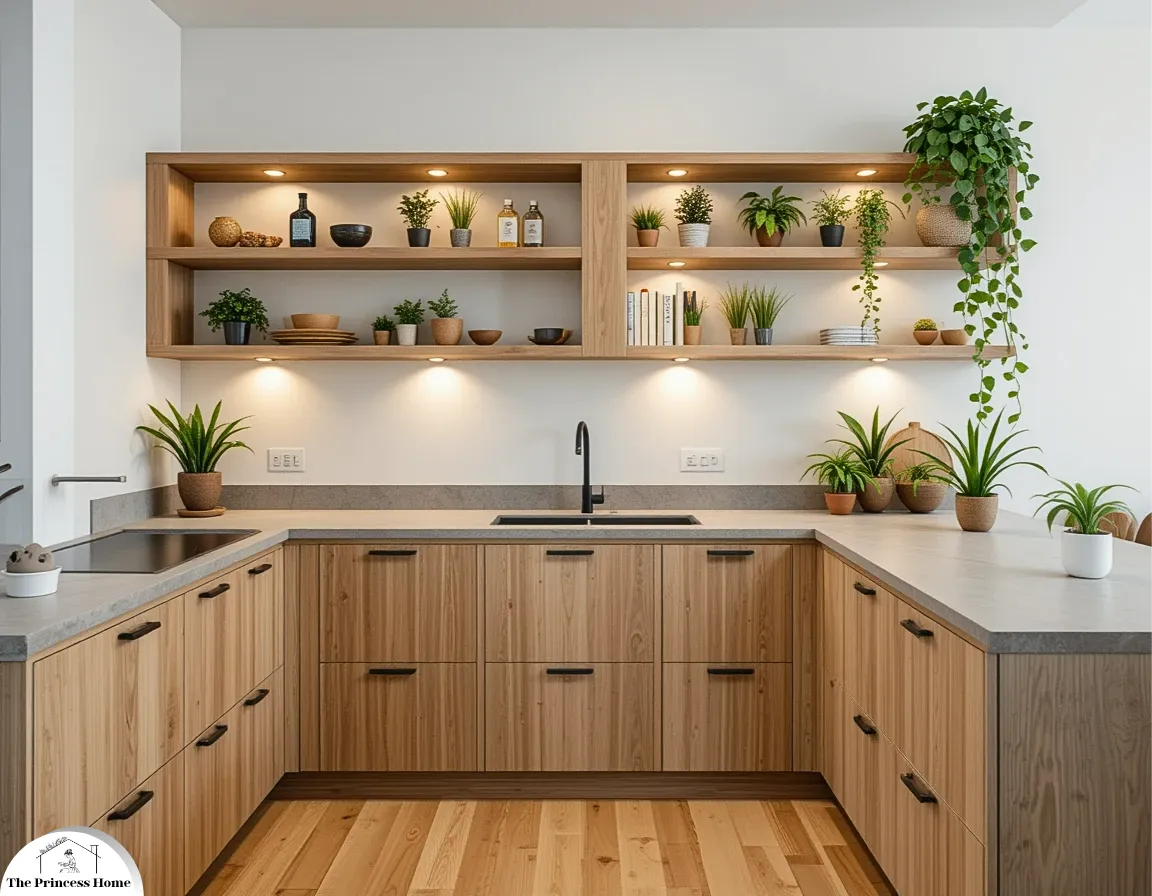
6. Concrete
Concrete countertops offer a unique and modern aesthetic, often bringing an industrial or contemporary flair to kitchen spaces. They are highly customizable in terms of color, texture, and shape, allowing for personalized design elements like inlays or integrated sinks. While concrete is durable and heat-resistant, it can be prone to cracking or staining if not properly installed and sealed. Regular maintenance is required to preserve its appearance, but for those seeking a bold, bespoke look, concrete delivers both style and strength.
Here’s a summary of the positives and negatives of concrete countertops:
Positives:
- Highly customizable – color, texture, shape, and inlays can be tailored to personal design.
- Modern and unique – ideal for industrial or contemporary aesthetics.
- Durable and heat-resistant – handles heavy use and hot items well.
- Bespoke appeal – creates a bold, one-of-a-kind focal point.
Negatives:
- Requires maintenance – needs regular sealing to prevent stains and wear.
- Prone to cracking – can develop hairline cracks over time.
- Heavy – may require reinforced cabinetry for support.
- Cost – custom designs can be expensive.

7. Stainless Steel
Stainless steel countertops are popular in professional kitchens due to their exceptional durability, heat resistance, and ease of maintenance. They offer a sleek, industrial aesthetic that complements modern and minimalist designs. While they are non-porous and highly hygienic, making cleanup effortless, stainless steel surfaces can show scratches, dents, and fingerprints over time. Despite these cosmetic concerns, they remain a top choice for serious cooks seeking a functional and contemporary kitchen workspace.
Here’s a summary of the positives and negatives of stainless steel countertops:
Positives:
- Extremely durable – resists heat, stains, and corrosion.
- Hygienic – non-porous and easy to clean, ideal for food prep.
- Low maintenance – requires minimal upkeep.
- Modern look – sleek, industrial aesthetic suits contemporary designs.
- Preferred by professionals – trusted in commercial kitchens.
Negatives:
- Shows wear – prone to scratches, dents, and fingerprints.
- Noisy – can be louder than other materials when objects are placed on it.
- Cold appearance – may feel too clinical or sterile for some home styles.
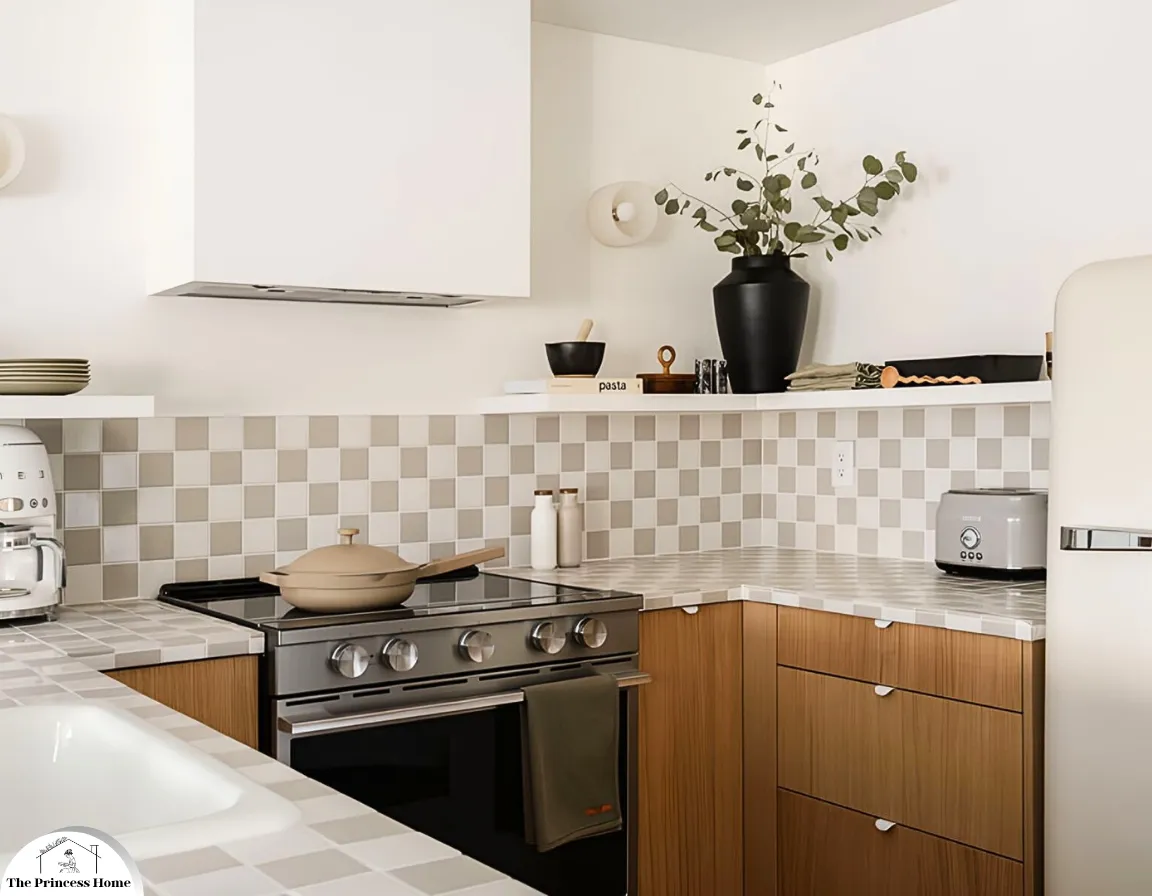
8. Tile
Tile countertops are a versatile and budget-friendly option, offering endless design possibilities through various colors, shapes, and patterns. They are durable, heat-resistant, and easy to replace in small sections if damaged. However, the grout lines between tiles can be difficult to clean and may stain or harbor bacteria without proper sealing. With regular maintenance, tile countertops can provide a charming and creative touch to both traditional and eclectic kitchen styles.
Here’s a summary of the positives and negatives of tile countertops:
Positives:
- Affordable – budget-friendly and cost-effective.
- Highly customizable – wide range of colors, shapes, and patterns.
- Heat-resistant – handles hot pots and pans well.
- Easy to repair – individual tiles can be replaced if damaged.
- Creative appeal – suits eclectic, traditional, or artistic kitchens.
Negatives:
- Grout maintenance – grout lines can stain, crack, or harbor bacteria if not sealed properly.
- Uneven surface – can make cutting or rolling dough more difficult.
- Less seamless – lacks the smooth, continuous look of solid-surface materials.
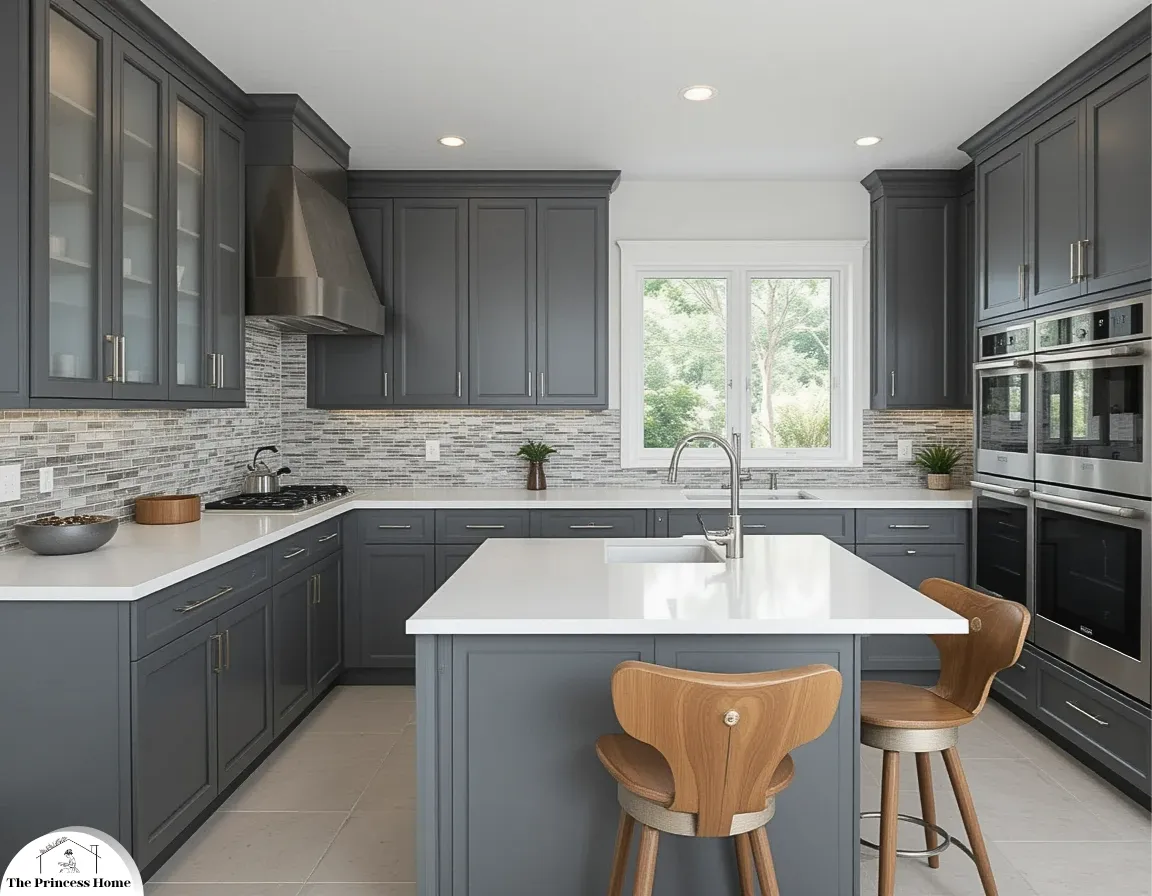
9. Solid Surface
Solid surface countertops, such as Corian, offer a sleek, seamless appearance that enhances modern kitchen designs. They are highly resistant to staining and easy to repair if scratched or damaged. However, compared to natural stone, solid surfaces can be less durable and may scratch or scorch more easily under heavy use. Despite this, their non-porous nature and customizable design options make them a popular choice for homeowners seeking both style and practicality.
Here’s a summary of the positives and negatives of solid surface countertops:
Positives:
- Seamless look – smooth, continuous appearance enhances modern aesthetics.
- Non-porous – resists stains and bacterial growth.
- Repairable – scratches and minor damage can be easily buffed out.
- Customizable – available in many colors and shapes, including integrated sinks.
- Low maintenance – easy to clean and care for.
Negatives:
- Less heat-resistant – can scorch with hot pans.
- Prone to scratching – softer than stone surfaces and can show wear.
- Not as durable – may not withstand heavy-duty use as well as granite or quartz.

10. Soapstone
Soapstone countertops are prized for their smooth, velvety texture and timeless natural beauty. They are highly heat-resistant and non-porous, making them resistant to stains and bacteria. However, soapstone requires periodic oiling to enhance its rich color and maintain its appearance, as it naturally darkens and develops a unique patina over time. This low-maintenance material adds a classic, elegant touch to both traditional and modern kitchens.
Here’s a summary of the positives and negatives of soapstone countertops:
Positives:
- Heat-resistant – handles hot pots and pans with ease.
- Non-porous – naturally resists stains and bacteria.
- Low maintenance – doesn’t require sealing.
- Develops character – darkens and gains a patina over time.
- Elegant and timeless – suits both traditional and modern kitchens.
Negatives:
- Requires oiling – periodic mineral oil applications needed to maintain appearance.
- Softer surface – more prone to scratches and dents than granite or quartz.
- Limited color range – typically found in shades of gray with subtle veining.
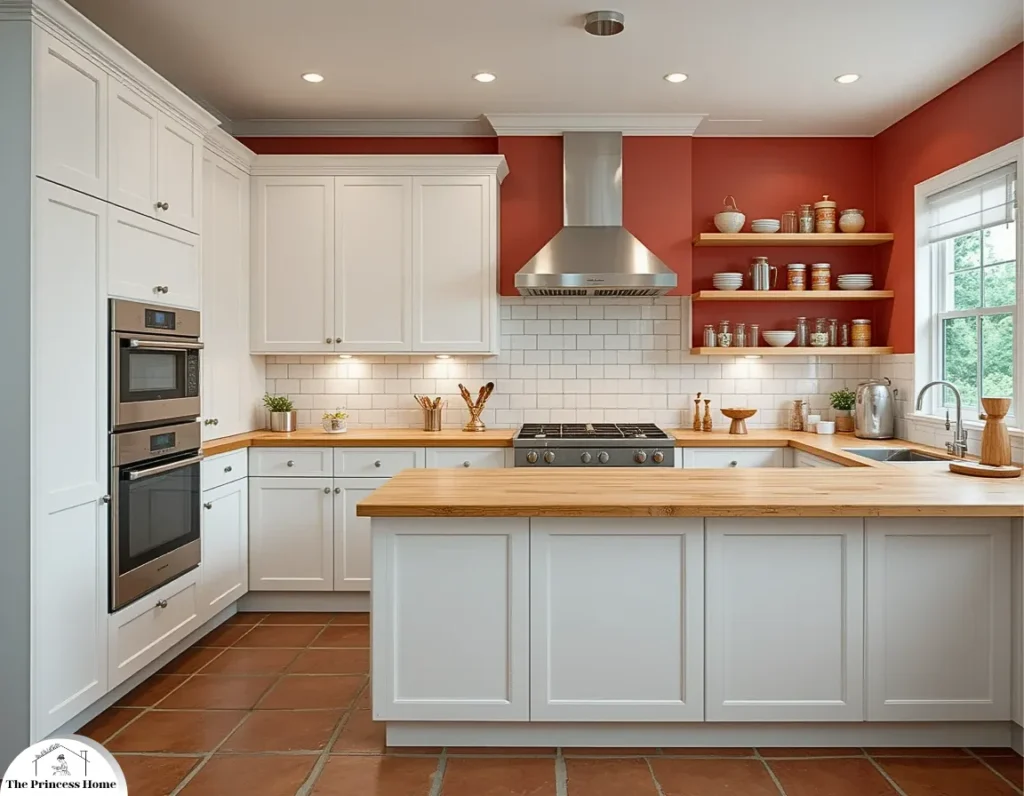
11. Bamboo Countertops
Bamboo countertops offer a warm, natural look with eco-friendly appeal. They’re made from fast-growing, renewable bamboo and are lightweight yet durable. While they’re resistant to warping, they do require regular sealing to prevent stains and moisture damage. Ideal for green-minded homeowners seeking a unique, sustainable surface.
Here’s a summary of the positives and negatives of bamboo countertops:
Positives:
- Eco-friendly – made from fast-growing, renewable bamboo.
- Warm, natural appearance – adds a cozy, organic feel to kitchens.
- Durable and lightweight – strong yet easier to handle than some stone options.
- Resistant to warping – holds up well against moisture when properly maintained.
Negatives:
- Requires regular sealing – to prevent stains and moisture damage.
- Prone to scratches and dents – softer than stone or metal surfaces.
- Can discolor – may darken or change color over time with exposure to sunlight and use.
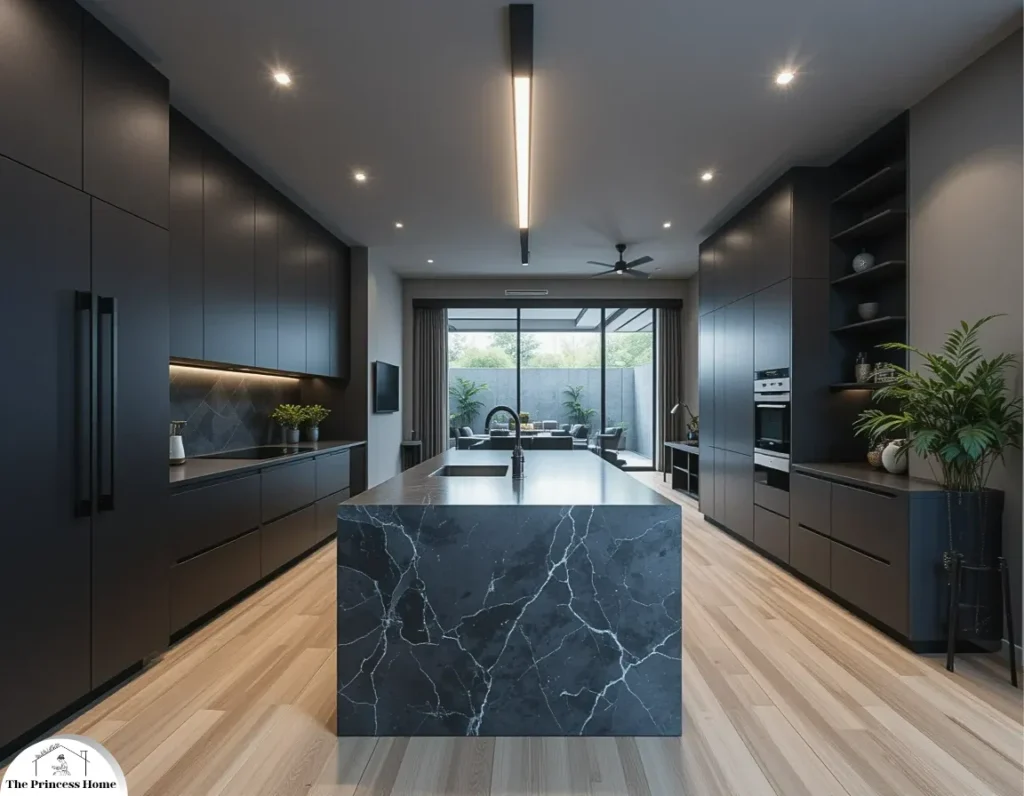
12. Dekton
Dekton countertops are ultra-compact surfaces made from a sophisticated blend of raw materials, including glass, porcelain, and quartz. Through a process called sinterized particle technology, these materials are fused under extreme heat and pressure to create a highly durable, non-porous surface. Dekton is renowned for its exceptional resistance to heat, scratches, UV rays, and stains, making it an excellent choice for both indoor and outdoor applications. Available in a variety of colors and finishes, Dekton offers a sleek, modern aesthetic while demanding very little maintenance.
Here’s a summary of the positives and negatives of Dekton countertops:
Positives:
- Extremely heat resistant – can handle hot pots and pans directly.
- Highly durable – resistant to scratches, stains, UV rays, and abrasion.
- Non-porous – does not require sealing and is easy to clean.
- Versatile – suitable for both indoor and outdoor use.
- Design flexibility – comes in large-format slabs with a variety of colors and finishes.
Negatives:
- More brittle than some surfaces – can chip or crack from blunt impact, especially on edges.
- Professional installation required – very hard and dense, making it difficult to cut and install without specialized tools.
- Limited warmth – can feel colder and more industrial compared to natural stone or quartz.
Here’s a comparison of common countertop materials, ranked from best to least in overall quality, considering durability, maintenance, aesthetics, heat/scratch/stain resistance, and overall performance. Keep in mind, “best” can vary depending on use case (e.g., kitchen vs. bathroom) and personal priorities like eco-friendliness or price.
✅ Top Tier (Premium Quality)
- Dekton
- 🔹 Ultra-durable: Heat, stain, and scratch resistant
- 🔹 UV resistant (great for outdoor kitchens)
- 🔹 Nearly maintenance-free
- ❗ Can be expensive and may chip at edges
- Quartz (Engineered Stone)
- 🔹 Non-porous, very durable
- 🔹 Low maintenance
- 🔹 Wide color/pattern range
- ❗ Not heat-proof (can be damaged by hot pots)
- Granite
- 🔹 Natural, strong, and heat resistant
- 🔹 Unique appearance
- ❗ Requires periodic sealing to prevent staining
- Marble
- 🔹 Luxurious, timeless appeal
- 🔹 Great for baking surfaces
- ❗ Stains and scratches easily; high-maintenance
⚖️ Mid Tier (Balanced Performance/Cost)
- Concrete
- 🔹 Customizable, modern aesthetic
- 🔹 Heat resistant
- ❗ Prone to cracks, must be sealed regularly
- Solid Surface (e.g., Corian)
- 🔹 Seamless installation, easy to repair
- 🔹 Non-porous
- ❗ Can scratch or scorch more easily than stone
- Stainless Steel
- 🔹 Hygienic, heat and stain resistant
- 🔹 Great for modern or industrial kitchens
- ❗ Shows fingerprints, scratches easily
- Soapstone
- 🔹 Heat resistant, soft matte look
- 🔹 Develops natural patina
- ❗ Softer stone—can dent/scratch more easily
💲 Lower Tier (Budget-Friendly)
- Wood (Butcher Block)
- 🔹 Warm, natural look
- 🔹 Can be sanded and refinished
- ❗ Prone to water damage, needs frequent sealing
- Bamboo
- 🔹 Eco-friendly, unique appearance
- ❗ Softer than wood, not as durable or water-resistant
- Tile
- 🔹 Budget-friendly, heat-resistant
- ❗ Grout lines are hard to clean, can crack or chip
- Laminate
- 🔹 Very affordable, wide design variety
- ❗ Prone to scratches, burns, water damage
- ❗ Not repairable
📝 Summary Table
| Rank | Material | Durability | Maintenance | Heat Resistance | Aesthetic | Cost |
|---|---|---|---|---|---|---|
| 1 | Dekton | ⭐⭐⭐⭐⭐ | ⭐⭐⭐⭐⭐ | ⭐⭐⭐⭐⭐ | ⭐⭐⭐⭐ | $$$$ |
| 2 | Quartz | ⭐⭐⭐⭐ | ⭐⭐⭐⭐ | ⭐⭐ | ⭐⭐⭐⭐ | $$$ |
| 3 | Granite | ⭐⭐⭐⭐ | ⭐⭐⭐ | ⭐⭐⭐⭐ | ⭐⭐⭐⭐ | $$$ |
| 4 | Marble | ⭐⭐⭐ | ⭐⭐ | ⭐⭐⭐ | ⭐⭐⭐⭐⭐ | $$$$ |
| 5 | Concrete | ⭐⭐⭐ | ⭐⭐ | ⭐⭐⭐⭐ | ⭐⭐⭐⭐ | $$$ |
| 6 | Solid Surface | ⭐⭐⭐ | ⭐⭐⭐⭐ | ⭐⭐ | ⭐⭐⭐ | $$ |
| 7 | Stainless Steel | ⭐⭐⭐ | ⭐⭐⭐ | ⭐⭐⭐⭐ | ⭐⭐⭐ | $$$ |
| 8 | Soapstone | ⭐⭐ | ⭐⭐ | ⭐⭐⭐⭐ | ⭐⭐⭐ | $$$ |
| 9 | Wood | ⭐⭐ | ⭐ | ⭐⭐ | ⭐⭐⭐ | $$ |
| 10 | Bamboo | ⭐ | ⭐ | ⭐ | ⭐⭐ | $ |
| 11 | Tile | ⭐⭐ | ⭐ | ⭐⭐⭐⭐ | ⭐⭐ | $ |
| 12 | Laminate | ⭐ | ⭐⭐⭐ | ⭐ | ⭐⭐ | $ |
Absolutely. Here’s your countertop material comparison, rearranged by:
🔹 Affordability (Least Expensive to Most Expensive)
| Rank | Material | Notes |
|---|---|---|
| 1 | Laminate | Cheapest option; wide design variety |
| 2 | Tile | Low material cost, but grout maintenance |
| 3 | Bamboo | Affordable and sustainable |
| 4 | Wood | Mid-range; varies by type of wood |
| 5 | Solid Surface | Cheaper than stone; easy to repair |
| 6 | Concrete | Mid to high depending on customization |
| 7 | Soapstone | Costs similar to granite |
| 8 | Stainless Steel | More costly due to fabrication |
| 9 | Granite | Price varies by rarity and cut |
| 10 | Quartz | Engineered stone—high quality = higher cost |
| 11 | Marble | Premium natural stone = expensive |
| 12 | Dekton | One of the most expensive |
🌿 Eco-Friendliness (Most to Least Eco-Friendly)
| Rank | Material | Notes |
|---|---|---|
| 1 | Bamboo | Fast-growing, renewable, highly sustainable |
| 2 | Wood | Sustainable if FSC-certified; recyclable |
| 3 | Recycled Tile | Eco-friendly versions available |
| 4 | Concrete | Can be made with recycled materials |
| 5 | Soapstone | Natural and long-lasting |
| 6 | Granite | Natural, but quarrying and transport are energy-heavy |
| 7 | Marble | Similar to granite in environmental impact |
| 8 | Quartz | Manufactured, but often with recycled content |
| 9 | Dekton | Long lifespan, but energy-intensive production |
| 10 | Solid Surface | Made from petrochemicals |
| 11 | Laminate | Made with plastic resins; not recyclable |
| 12 | Stainless Steel | Energy-intensive to produce, but recyclable |
🎨 Aesthetic Appeal (Most Desirable to Least, General Public Preference)
| Rank | Material | Notes |
|---|---|---|
| 1 | Marble | Classic luxury; veining is widely admired |
| 2 | Quartz | Wide range of consistent, stylish patterns |
| 3 | Granite | Natural beauty with unique stone patterns |
| 4 | Dekton | Sleek, modern; mimics stone, concrete, or wood |
| 5 | Soapstone | Subtle, matte, aged elegance |
| 6 | Concrete | Industrial and customizable look |
| 7 | Wood | Warm, rustic and timeless |
| 8 | Stainless Steel | Modern and clean, but utilitarian |
| 9 | Solid Surface | Seamless, but can look artificial |
| 10 | Bamboo | Unique look; lighter and more casual aesthetic |
| 11 | Tile | Colorful, but grout lines reduce elegance |
| 12 | Laminate | Wide variety, but often looks artificial |
Conclusion
selecting the best kitchen counter involves striking a harmonious balance between elegance and effectiveness. The right choice will not only enhance the beauty of your kitchen but also make it a practical and enjoyable space. Consider your lifestyle, design preferences, budget, and maintenance capabilities when making your decision. Ultimately, the best kitchen counter is the one that aligns with your unique needs and style, making your kitchen a true heart of the home.
Here are some frequently asked questions related to the article :
1. Which kitchen counter material is the most durable and low-maintenance?
Quartz is often considered the most durable and low-maintenance kitchen counter material. It is non-porous, making it highly resistant to staining and easy to clean. It also doesn’t require sealing, unlike natural stone options like granite and marble.
2. Are marble countertops a good choice for a busy kitchen?
Marble countertops are renowned for their timeless elegance, but they may not be the best choice for a busy kitchen. They are susceptible to staining and require regular sealing to maintain their appearance. If you love the look of marble but want something more practical, consider quartz with a marble-like pattern.
3. Can I use wood countertops in my kitchen, or are they too high-maintenance?
Wood countertops can be used in kitchens, but they do require more maintenance compared to some other materials. They can be prone to scratches and staining. However, regular sealing and periodic maintenance can help preserve their beauty. If you like the warmth of wood, consider using it on an island or in a specific area for a stunning accent.
4. What are the pros and cons of using stainless steel countertops in a home kitchen?
Stainless steel countertops are durable, heat-resistant, and easy to clean, making them a popular choice in professional kitchens. However, they can show scratches and fingerprints more prominently than other materials. The industrial aesthetic might not be suitable for all kitchen designs.
5. How do I choose the right kitchen counter material that complements my kitchen’s style?
To choose a material that complements your kitchen’s style, consider the overall design. For a modern kitchen, materials like quartz or concrete may work well. Traditional kitchens may benefit from the warmth of wood or the timeless appeal of granite. Rustic kitchens can be enhanced with natural stone or wood counters. Think about the colors, patterns, and textures that align with your design vision.
6. Are there eco-friendly options for kitchen counters?
Yes, there are eco-friendly kitchen counter options. Materials like bamboo, recycled glass, and concrete made with recycled content are more environmentally sustainable choices. Research the sustainability and sourcing practices of the materials you’re interested in to make an eco-conscious decision.
7. Can I install a kitchen counter myself, or should I hire a professional?
The complexity of installation depends on the material you choose. Some materials, like laminate, are relatively easy to install for DIY enthusiasts. However, materials such as natural stone, quartz, or concrete may require professional installation due to their weight and intricacies. For a successful and long-lasting installation, it’s often advisable to hire a professional.
8. Which kitchen counter material adds the most value to my home if I plan to sell it in the future?
High-quality natural stone, like granite or quartz, often adds the most value to a home when considering resale. These materials are durable, aesthetically pleasing, and appeal to a wide range of potential buyers. They can make your kitchen a selling point for your property.
9. Can I mix and match different kitchen counter materials in my kitchen?
Mixing and matching different counter materials is an emerging trend in kitchen design. You can use different materials for various kitchen zones, such as using a durable, low-maintenance material for high-use areas and a more decorative material for a kitchen island or dining area. However, achieving a cohesive look and design requires careful planning and consideration of aesthetics.
10. How do I prevent damage to my kitchen counters, and what’s the best way to clean and maintain them?
To prevent damage, use cutting boards, trivets, and hot pads to protect your counters from scratches and heat. Regularly clean your counters with a mild, pH-balanced cleaner and avoid abrasive or acidic substances. Follow the specific care instructions for the material you’ve chosen to ensure its longevity and appearance.


